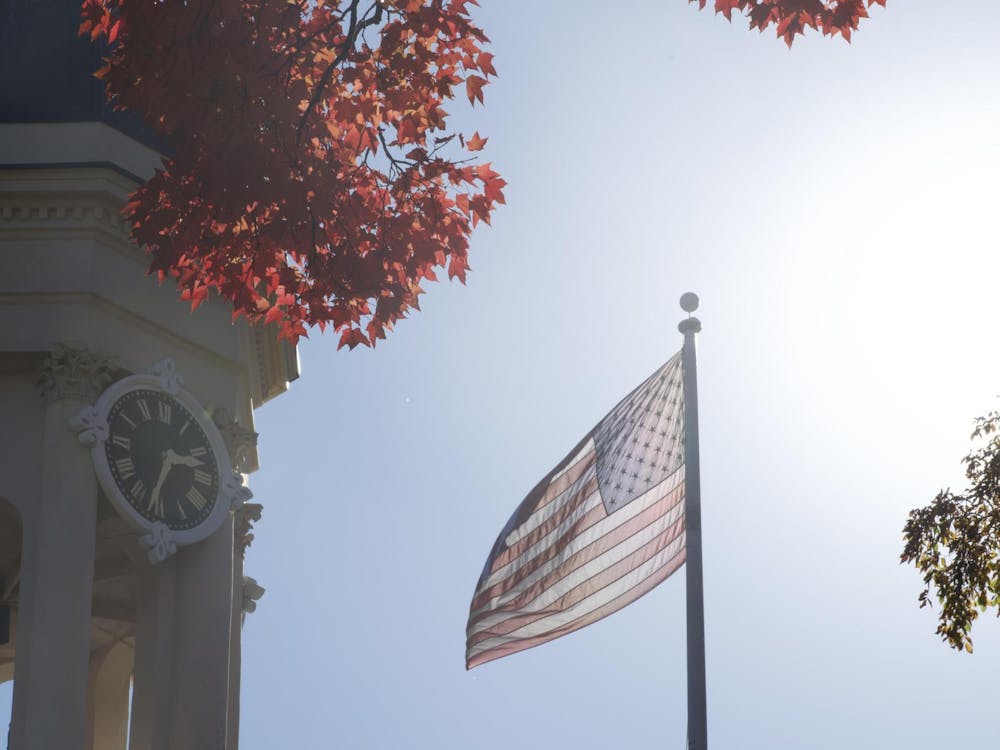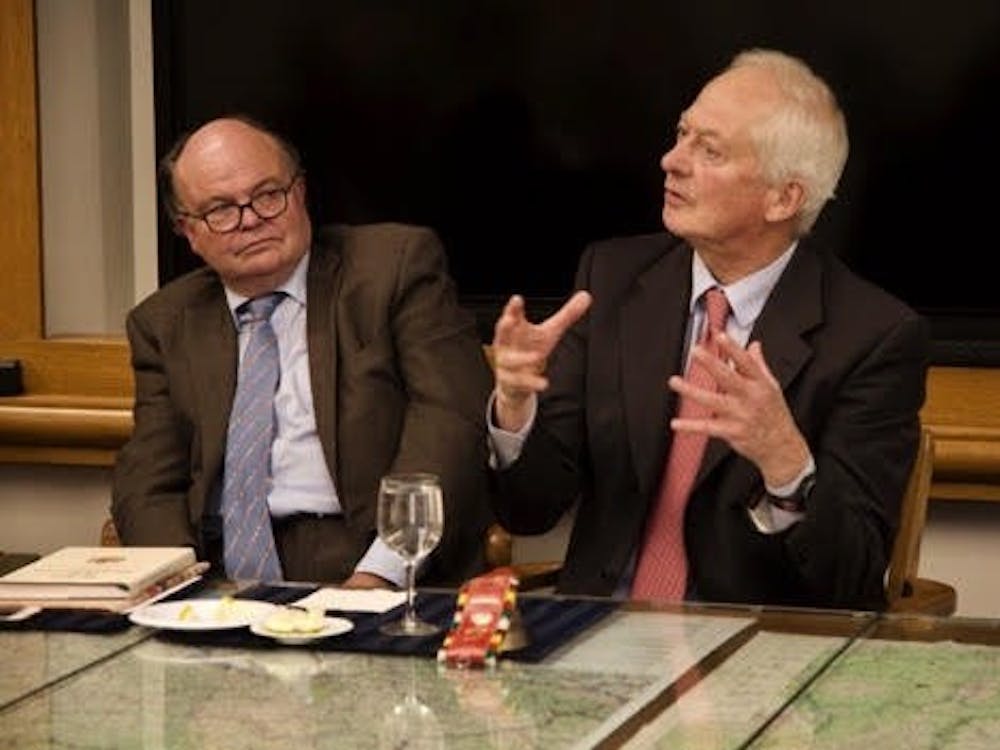When the three most recent USG presidents posed together for a picture at a party in Tower Club last semester, they contentedly joked about the scene being captured on film — a multi-ethnic Mount Rushmore for 1990s Princeton.
David Ascher '99 is Jewish and a member of Zeta Beta Tau fraternity. Spencer Merriweather '00 is an African American and hails from Mobile, Ala. And PJ Kim '01, who is Korean, was the occasion's center of attention, having been minted an American citizen just that morning.
But, these days, those USG members who treasure diversity in student government can only look at that picture with a worried sense of nostalgia. With the recent election of an all-male U-Council — nine out of 10 of whom are white — the USG senate is looking far more homogenous than it did during the Merriweather administration.
And some USG members fear that this diversity deficiency may be undermining their organization's legitimacy with students and administrators.
"I was absolutely shocked by the results of the U-Council elections. It is surprising that the U-Council is all male," said a "very upset" U-Council chair Teddy Nemeroff '01. "We've actually had a lot of conversations about the sex ratio."
Yet diversity can be measured in a variety of ways. USG officers are quick to point out that students from every eating club except Colonial participate in the senate — including mavericks like U-Councilor Jim DeRose '01, a member of Ivy Club and Sigma Alpha Epsilon fraternity, who claims to represent the interests of fraternities and sororities in the USG. U-Councilor Tovah Rosen '02, an Orthodox Jew from Brooklyn and former senator Jo Chen '00 of Singapore have been vocal supporters of substanceand smoke-free housing.
"The leadership of the USG is more diverse than almost all other groups on campus," Kim said. "A majority of ex-comm [the executive committee] are women or minorities — eight out of 14 people."
Kim himself is something of a standard-bearer for diversity, born in a Korean naval base on the southern coast of South Korea and raised in Baton Rouge, Louisiana. The deeply patriotic former ROTC candidate has also resided in North Dakota and Philadelphia since coming to Princeton three years ago.

But while the photograph taken at Kim's citizenship celebration shows a lineage of USG presidents rich in racial diversity, it also belies the near-total absence of a different kind of diversity. Like the three former presidents pictured in the photo, all 16 of next year's senators and U-Councilors are men.
Gender favoritism
USG student groups liaison Aime Scott '01 blamed voters partially for the gender imbalance. "It's not that there weren't women running," she said. "They just weren't voted [for] . . . Women, when they are asked to choose a leader, tend to choose men over women."
Indeed, the five women who ran for U-Council this month — including Rosen, an incumbent, and freshman class social chair Nina Langsam — all lost. In total, 20 students sought U-Council seats this spring.
Though Scott believes the disproportionately small number of women "has less to do with the USG necessarily than with people voting," she said the atmosphere of USG meetings "could be intimidating" for women.

"The women's style in the USG is different than the way the men do things," she said. "They are more verbose and they're louder."
USG social chair Carolyn Chao '01 had a different take on the male dominance of the USG. "I think that has a lot to do with who runs," she said. "I ran against two guys. It's not like only guys get elected."
Chao also said she believes the election of an all-male U-Council will have only a limited effect on the USG's dynamic. "I don't think its going to be a more macho group now," she noted.
Patricia Garcia-Monet '92 — a Hispanic former USG president who is one of three women to ever serve in that role — agreed with Scott and Chao that there are not enough women running for office and not enough voters turning out to support them.
"I think there used to be more women than there is now," she said. Garcia-Monet emphasized the importance of letting supporters know that "for all of us to be elected as women, and me as a minority, they would have to come out and vote."
Kim said he was "unconcerned" about the all-male nature of next year's U-Council because women will hold eight of 15 class officer positions. "There is really no rhyme or reason of how people distribute themselves" between the class officer positions and other USG posts, he explained.
He said he has tried to make the USG more diverse through his four executive committee appointments, which included two women, a tactic used by Nemeroff and Merriweather, as well.
"One of the ways — for better or worse — I boosted the number of women in my administration was through appointments," Merriweather said.
Kim also argued that the new U-Council — which includes four freshmen — scores well on other measures of diversity. "That is an important diversity quality that should not be overlooked," he said of the high proportion of members from the class of '03. Among the freshmen are one Orthodox Jew, Jacob Glass, and one Hispanic student, Rolando Amaya.
But others see problems beyond the gender imbalance. U-Councilor Melissa Briggs '02, who is stepping down from her post after this semester to pursue other extracurricular interests, said, "I hope it doesn't get more isolated. It does seem to be getting less and less diverse in my three periods of elections."
Briggs, who is an African American, theorized that the USG's gender and racial gap developed because women and minorities are choosing to participate in other activities. Merriweather, Garcia-Monet and others echoed this theory.
"I hope that more people that didn't consider it initially a top priority would invest and see if this is a place where they can have an effect," said Briggs, who termed her theory "ironic" in light of her own decision to leave the USG at the end of this semester. "The purpose of the group isn't being fulfilled if it isn't a representative body."
She praised as healthy the almost-partisan infighting that often occurs in senate meetings, but lamented that there are not even more viewpoints represented. "There seems to be two groups of opinions on most subjects but not more," she said.
Finding balance
Merriweather also said he was "concerned" and "worried" about the USG's composition. "It is going to be tough for the USG to have credibility on a lot of issues on campus when there are 12 men sitting on the U-Council," he said.
He said he believes the racial background of USG officials does influence the way they lead. "Do I think that my being a racial minority led to a certain sensitivity to racial issues on campus? Yes. Setting my priorities? Yes."
Nevertheless, Merriweather said he is confident that the USG members — aware of their organization's diversity deficiency — would make a concerted effort to deal with the concerns of minorities and women.
"There have been some women and minorities in student government who haven't necessarily been the greatest champions of the interests of their supposed constituencies," he said, adding that, at times, the same accusation was leveled against him.
"There have been instances where the whitest of white males — Teddy Nemeroff or Lee Vartan in particular — have been the greatest champions for the plight of women and minorities on this campus," he added.
Kim, for his part, remains upbeat about the USG's composition. Reminded that a member of every eating club except Colonial sits on the USG senate, for example, he countered that the club is indeed represented. Asked which senate participant is a Colonial Club member, he thought for a few moments and offered Larry Fu '02, a USG Web coordinator — who is more of a resident computer whiz than a representative and never attends USG meetings.
"I suppose we could go out and make a really hard sell to get people to run, but if they weren't really into it, it wouldn't be too successful," he added.
But Kim said he believes more women and minorities would run for office if they knew they could have a real effect on the undergraduate experience through the USG. He speculated the decision of performing arts advocates such as Tom Vessella '03 to join the U-Council is related to the USG's increasing attention to the issue of campus performing space.
What the USG could do, Kim said, is convince minorities and women that the USG is an effective outlet for their concerns.
And Scott is trying to do just that. She is planning a second and more ambitious Princeton Leadership Summit to educate campus groups about the administration, the USG and student group issues.
Scott has also been attending meetings of minority group leaders, such as last week's discussion at the Third World Center. "I do think the USG should reach out to minorities and women," said Scott, who was appointed to her position. "It would have never occurred to me to run for a position."
Regardless of whether Scott's efforts succeed in attracting more women to student government, Merriweather said women would not be drowned out in the din of the overwhelmingly male USG. "The Carolyn Chao's and Aime Scott's, though few in number, represent a really powerful voice."







